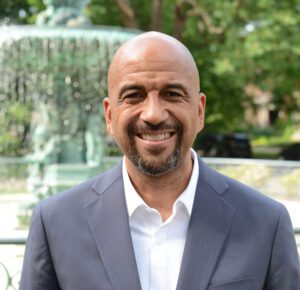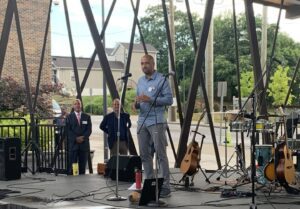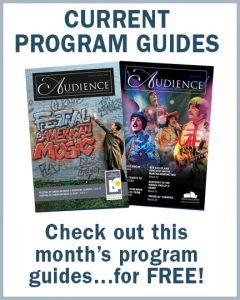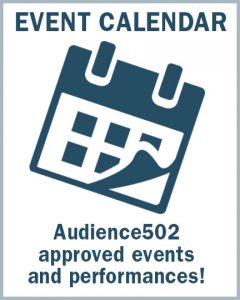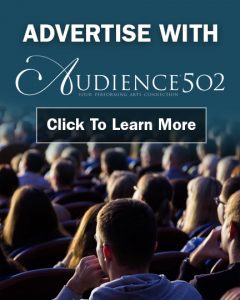The Fund for the Arts is a vital asset for the arts in Louisville. Its goal is to provide arts access and education, and foster diversity, as well as promote the city as a nationally recognized epicenter of the arts. During a roller coaster of a year — the arts and the community overall are just now starting to rebound from the challenges of the pandemic — Christen Boone, who has navigated the Fund for the past seven years, announced her resignation.
After a national search for a new President and CEO, the Fund for the Arts’ next chapter will be led by one of Louisville’s own, Andre Kimo Stone Guess. With an extensive background in arts and entertainment world from consulting to management, he is ready to roll up his sleeves and get to work on many important issues around our community.
On Tuesday, June 30, Guess was publicly introduced at the Fund for the Arts Summer Arts Kick-off that was attended by Mayor Greg Fischer, this year’s Campaign Chairperson, and Brown-Forman Chairman, Campbell Brown, Board Chairman and CEO of Stock Yards Bank, James ‘Ja’ Hillebrand, and outgoing President & CEO for the Fund, Christen Boone.
Audience publisher, G. Douglas Dreisbach, caught up with Guess to learn more about his background, his interest in the arts and the community, and what he is excited about for the future of the Fund for the Arts.
Listen to the full interview below:
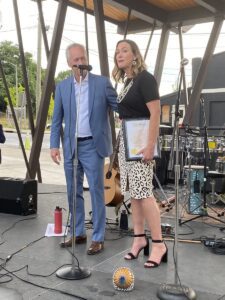
Mayor Greg Fischer and Christen Boone introduce Andre Stone Kimo Guess at the Fund for the Arts Summer Arts Celebration.
G. Douglas Dreisbach: Being a Louisville native, you can appreciate the importance of an organization like Fund for the Arts and everything they have done up to now. What initially drew your interest to the position for President and CEO, and what are you looking forward to the most about the role?
Andre Kimo Stone Guess: I was born and raised here in Louisville, and my family goes back over 100 years in the Smoketown neighborhood, so I have deep roots in the community. I have had a very circuitous route to where I find myself sitting here with you today as the new President and CEO of the Fund for the Arts. I got accepted to Boston University in the six-year medical program right out of high school, I went to Male High School, and thought I wanted to be a physician early on but found out quickly I didn’t want to be a doctor. So, I ended up coming home and going to University of Louisville and got a degree in economics with a minor in actuarial math. I found out that with actuarial math, if you could pass one of those exams, you would guarantee yourself a job, and I was always good at math. So, I passed the first actuarial exam, got a job at Capital Holding and worked there for four years but realized that I didn’t really like the corporate world. I really wanted my life’s work to have an impact on something greater than my own personal bottom line or the bottom line for a company.
So, I transitioned into the nonprofit world, working for the Lincoln Foundation here in Louisville. The Lincoln Foundation is an o perating educational foundation that runs programs for academically talented, economically disadvantaged youth. I’d gone through a couple of their programs when I was a kid and had a good relationship with the president at the time, Dr. Sam Robinson. I went to middle school with his daughter, and oddly enough, that same daughter went to college with my wife, and so we reconnected, and I started working for him. And after a year or two, he began to think about a succession plan for himself, so he promoted me to Vice President and was grooming me to be the next President. I ended going back to University of Louisville to work on a Ph.D. in urban and public affairs and was writing my dissertation when I got a call from my dear friend Wynton Marsalis, in New York. He asked me if I’d be interested in coming to help them prepare for moving into and building their new — what is now Jazz at Lincoln Center’s new home at Columbus Circle in the Time Warner Center and Columbus Circle.
So, I was like, “Wow, this is the opportunity of a lifetime!” So, my wife and three young children, ages 7, 4, and 1 at the time, packed up and moved to New York. I started off as the Chief Financial Officer, and then a couple of years later became the Executive Producer and produced concerts and tours all over the world. I did that for almost seven years and then started my own management and consulting firm, GuessWorks Inc., where I did a combination of managing the career of some Grammy Award-winning world-class artists, and also doing some really exciting consulting work with arts organizations all over the world.
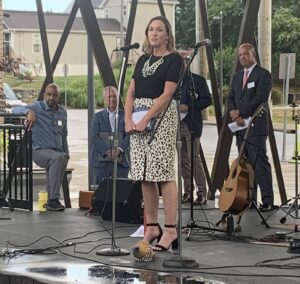
Outgoing Fund for the Arts President & CEO Christen Boone introduces Andre Stone Kimo Guess as he looks on.
In 2010, I was working on a consulting project in Pittsburgh and found out they had an opening for the CEO of the August Wilson Center for African American Culture there and ended up getting offered that job with a two-year contract. I did it for two years but did not renew my contract, and decided we needed to figure out what we were going to do next. Instead of moving back to New York or staying in Pittsburgh, we decided to move back to Louisville, where my wife and I were both from, and that was in 2012.
So, I’ve actually been back in Louisville for eight years. A lot of people think that I just moved back, but that was because I was traveling 150-200 days a year. In 2019, we had decided that we wanted to move to New Orleans, and the reason we stayed for as long as we did was to get our daughters, our two younger daughters, out of school. But then COVID happened, and then Breonna Taylor happened, and George Floyd happened, and so my wife and I kind of looked at each other like, “We can’t leave. We have to stay here, and we have to get involved.” And one of the reasons I wasn’t involved is because I just didn’t have the time. I didn’t want to stick my toe halfway in the water. If I was going to be involved, I needed to be involved.
So, I went back to consulting full time. A lot of projects were coming my way, none in Louisville, doing a lot of projects nationally. Things went well. We bought a condo on St. James Court, our empty nest forever home — our retirement home. I was doing these projects, and having a good time. Life was good.
And then, a friend of mine sent me an invitation on LinkedIn and I was like, “I don’t want them to think I’m ignoring them,” So I clicked on accept, and it took me to the site, and I almost never use LinkedIn. I went to LinkedIn, and I had a bunch of messages, which I had not read, but for some reason, I was drawn to a message from a friend at GE named Katina Whitlock and she said, “I think this job is perfect for you,” and it was the posting for the Fund for the Arts job. I clicked on it and read it, and it was as if the job description had been written with me in mind, in terms of my experience, in terms of what they’re trying to do with equity, diversity, and inclusion, in terms of all the things that the Fund had really been doing to set up all of these things, with the cultural plan for the city, Imagine 2020 and then Imagine 2025.
It was really refreshing and eye-opening because I hadn’t been paying attention to any of that. I’d just been hearing the problems. And so, I applied for it on the spot. I pulled my resume out, changed a couple of things, wrote a cover letter and sent it. I went in the other room and said to my wife, “Cheryl, guess what? I just applied for a job! She’s like, “What? A job?” She’s like, “Wait, where?” I said, “Here.” And even before she asked me what the job was, she says, “You applied for a job? Really?” After Pittsburgh and doing consulting and management with traveling around the world, I really couldn’t imagine myself going back into an office. I couldn’t imagine myself “working for someone” again.
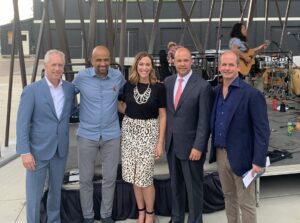
Mayor Greg Fischer, Andre Stone Kimo Guess, Christen Boone, James ‘Ja’ Hillebrand and Campbell Brown pose at the Summer Arts Celebration.
But the opportunity was like a calling. It was like I had to do it. Where we find ourselves now, and why we decided to stay, I wanted to get involved in the art community and volunteer and be on some boards and try to bring some of the things that I had access to nationally here to sort of help with the healing.
That’s a long way of saying how a little kid from Smoketown ended up clicking an open job description. It was like the description was written for that little boy from Smoketown, coming back home to take on this role.
GDD: Wow, what a great story. How does the arts community in Louisville really compare to places like New York or Pittsburgh?
AKSG: Louisville’s art footprint is disproportionate to the size of the city, disproportionately large. Louisville, for the longest time, had the largest per capita giving in the arts than any other city in the country. The arts community and the arts organizations, because of organizations like Fund for the Arts, historically have sort of banded together to move the arts forward. It hasn’t always been as inclusive as it could be, which is why they went through the work in 2017, and now of course, because of all the things that have gone on recently, there’s much more focus on it.
But having said that, the one thing I do like about the scene in Louisville is that the community is small enough that you can take that art footprint, and while you’re expanding it, you can still steer it in a direction where a significant amount of that ecosystem can move in that direction, and the city saw value in developing a cultural plan that involves the entire ecosystem.
Now, we’ve got to do a better job of making sure that all aspects of the ecosystem are included in the plan, and that’s part of my charge in this, but we can move this and steer it in a direction that gets us to where we need to go, which is moving forward and taking everybody with us.
How we compare — I mean, you can’t compare any other city to the New Yorks and the L.A.s of the world, because they have their own sort of micro-ecosystems of art, and there’s not necessarily a community- or a city-wide effort to promote it or even understand it, how it works together in a way to enhance all aspects of it.
Now, a town like Pittsburgh has a very strong local arts scene, particularly an African American arts scene. Hence, they have the August Wilson Center for African American Culture on Liberty Avenue. Pittsburgh has a shared services model that a lot of the large foundations came together and sort of mandated, to a certain extent, that these organizations work together. But one thing about Pittsburgh is that it has those large funders, funders who have assets under management of over $1 billion, so a lot of the voices, a lot of the direction, can come from those voices because they have so much money. I’m not saying that they are steering the policy, but when you have somebody you can go directly to for those kinds of things, it’s kind of hard to steer, unless you have them all deciding that this is what we want to do for the city.
GDD: Have you had a chance to look into the current programs at Fund for the Arts and to get an idea of what’s going on right now and what the next chapter is going to be like? Do you see the programs that are in place right now to be beneficial? Or do you want to change them?
AKSG: Right now, I am taking full inventory and am in a complete listening and learning mode. I am not a change-for-change’s-sake kind of person. I really want to live out the vision of the organization, which is to have art enrich the lives of every person in every neighborhood, every day. But I want to make sure that that “every” is “every.” And so, the vision is there, in terms of what we need to do, just a matter of living that out and understanding. So, I am taking an inventory of what it is that we’re doing and understand the needs, the wants, the desires, and find out where the gaps are, from as wide a constituency as I can, and then coming from a consulting background, go in and figure out what the next steps are. It is really trying to distill it all down into key issues and then go back and say, “These are the issues that we’re dealing with. How do we deal with them?” So, I’m doing my own sort of mini-internal consulting project right now. Once we find those gaps, we can figure out how we are going to move the ecosystem north, but also living up to that vision of enriching the lives of everybody in every neighborhood every day.
GDD: Why do you feel the arts are important to communities of every ecosystem, of every part of the city and world? What is it about the arts that you feel is important for people?
AKSG: Well, at its most irreducible essence, art is a reflection of the human condition. To me, all art is storytelling, and those stories that we tell ourselves and we tell others help us to make sense of the world around us. It’s like I am sitting here right now at this time and I have the history that I’m looking back on, that has made me who I am or has made others around me the way that they are, and I have these hopes and dreams or even fears for the future. How am I going to deal with that? And then art is created.
Art is an important part of the historical record because when we learn history, we open up the book, and we read, “This happened on this date. This happened on that date.” But when we really engage with this, we really try to understand what was going on, as opposed to dates and events. We often deal with history through the lens of art, whether that art was art that came from that time, or whether it is someone dealing with that time today in art.
Also, art is one of the huge lever points that we can use to help heal and transform and bring about some level of equality with human beings. I often say that there are two things when we talk about equity and equality. I say that a commitment to equity in the arts is an investment in equality in humanity. What do I mean by that? It means if we look at the disparities that we often hear on the news and talk about all the time, particularly racial disparities or disparities between any group that is underrepresented, what are the ones we hear? We hear socioeconomic wealth. We hear education. We hear housing. We hear health. Now, if we can wave a magic wand tomorrow or today and close the gap on all of those disparities. You could have someone who’s a billionaire, lives on the biggest house on the hill, has five Ph.D.s, but that doesn’t mean that someone who does not look like that person is going to look at them and say, “You’re my equal.”
And so, if we’re ever going to realize Dr. King’s dream of people judging each other by the content of their character, I think there are a couple of ways that we can get to that level of equality. The first one is through spirituality. Notice I didn’t say religion, because religion can and does divide. But spirituality — it’s your relationship to your creator and how that relationship governs your relationship to your fellow human being. And the other one is the arts. Like I said before, art, at its almost irreducible essence, is how we reflect and deal with the human condition.
Art has the ability to strip away all of the tribal differences of human beings and reduce us to our homo sapien DNA, where we are all human. But at the same time, as it strips us down, it also elevates us. It elevates us to our humanity of how we deal with each other. I used to say life on Mars is the end of racism, sexism, whatever, as we know it, because if we find that there’s another intelligent being in the world, all of a sudden, Russia and America become nonexistent, right? We become human beings that have to fight for our own survival. We’re all earthlings. And so, it has that power to bring us down to our humanity and deal with each other as human beings.
GDD: During the pandemic, we saw a lot of resilience from artists and arts groups around the world. There were some livestreams and other ways they tried to stay connected but it just didn’t fill the gap of live entertainment. Looking back, some of the assumptions that you made initially about the pandemic, do you feel like they were accurate?
AKSG: Well, I felt at the time — I made my bold predictions about what I thought the new normal was going to be. I thought work life was forever changed because one of the things that happened with the pandemic was that you had this once-in-a-lifetime opportunity for employers to get their employees trained in technology in a way that they had to do it. They had to sink or swim. It was Darwinian. If a company decided two years ago, “I want everybody to be able to figure out how to work remotely because we’re not going to have an office anymore,” it would be hard, especially for some of your key employees that didn’t want to function in that way, but now you had to do it. There was no choice.
So now, these companies are seeing these efficiencies take place, and employees might not want to go back to a regular work week, they might like working in their pajamas or like working at three in the morning to six in the morning and watching The Price Is Right in the morning or whatever it might be.
So, I thought that that part of it was forever changed. The thing about venues is that I think people are craving gathering and getting back together, but there’s a certain segment of that that is forever changed, too. It is forever changed in the minds of the presenters of art, because to a certain extent, for live music, live performing venues, like there are here, your audience was a local or a regional one, someone who could drive. But now, when you stream it, you have the entire world as your audience, and so you think about ways of how do you do both and can you monetize that to get an incremental dollar over what it cost you to get it out to the rest of the world? Of course, you’re competing with everybody else in the world in doing that, but if you have a better mousetrap, you could see this as an opportunity.
GDD: Do you think there’s any silver linings that came out of COVID?
AKSG: Well, I think this applies to the arts, but it also applies to everyone. Last year, and we’re sort of tailing out of this now, but at this time layer year you could become completely selfish and decide to do something for your own personal development and just check out, and be focused completely on yourself, and pretty much no one would care. Nobody would be like, “Where’s Andre?” You know what I mean? Because everybody was just trying to figure it out. If you wanted to read 10 books on self-improvement, fine. So, that year or 18 months was an opportunity for everybody, individuals, organizations, to look at how they could get better. How to work on things that maybe they never got a chance to work on before. I would say that if you don’t have something coming out of COVID that you’re better at, that you weren’t good going into it, it was a lost opportunity.
Now in reality, that is easier said than done because there was fear. People were dying. I don’t mean to over-trivialize it. But to get over that initial shock and then think about where you found yourself, there was an opportunity to grow. There was an opportunity to understand the world that you live in and try to get ahead of it. There was an opportunity to be able to deal with adversity, so that you could better deal with it.
And speaking of that, when I started my business, when I left Jazz at Lincoln Center, it was late 2006, early 2007. That was a horrible time to start your own business because that was right before the housing bubble and was a rough time for us. But that rough time, understanding that and having dealt with it, really prepared us for this.
So, that’s why I was able to say, let’s hunker down and understand — we know what this is, from an economic standpoint, anyway, not necessarily a quarantine standpoint. So, knowing what we know, how do we get better? How do we come out of this as intact as possible, economically, but sort of spiritually, in terms of where we find ourselves practically, and skills-wise? How do we come out of it better?”
GDD: In closing, what we can look forward to in the coming years, and the excitement that you are going to bring to the Fund for the Arts?
AKSG: Well, the immediate — I can say that the world has a spotlight on Louisville right now, for reasons that we aren’t proud of. And quite frankly, the main reason I’m interested in this job is because the chasm that exists in my city, in my hometown, between the racial tension, the Ninth Street divide, and the segregation that we have. I feel like I have a responsibility to do everything I can to deal with that in my own community, to help promote healing in the community.
I’m looking at it concentrically. I need to deal with myself. I need to deal with my family. I need to deal with my community, and I need to deal with my city, and then the nation as a whole.
So, I think what it is that we have in the short term, and why I’m in this position, why I wanted it, is because I want that spotlight that’s here — I want it to capture things that shows the world that although we may have done some things and had a certain attitude about things, knowingly and unknowingly, that have to do with racial disparities and all kinds of the -isms that separate us, the tribalisms — that we are better than that. We are going to be intentional about overcoming them. We’re going to heal. We’re going to transform this city. We’re going to give you something to see while that spotlight is here, and we’re going to use the arts to do that for all communities, because it’s not just about marketing. It’s about — everybody needs to be able to heal, because we’re suffering right now. If the city were being diagnosed, we probably would be diagnosed with at least some level of depression, and the arts are a great anti-depressant.
Quick Hits with Andre Kimo Stone Guess
- Favorite music genre: I love jazz music.
- Favorite venue to watch a live performance: Village Vanguard (New York)\
- Favorite city to visit: Nationally, it’s San Francisco.
- Favorite things about Louisville: It’s my hometown. My neighborhood, Smoketown, the history, my family — it’s my hometown. Everything.
- Current books/TV series/podcasts that you’re into right now: I’m reading the Richard Wright novel, “The Man Who Lived Underground.”
- Hobbies or pastimes: I’m a vegan and a big health guy, so I have a Peloton bike. I run. I walk a lot when I’m thinking, but I’m on my Peloton almost every day.
- Any bucket list items that you’re still trying to cross off the list? This may sound crazy, but I could die tomorrow, and have no regrets. I’ve done everything that I want to do. Everything else for me at this point is just gravy.

